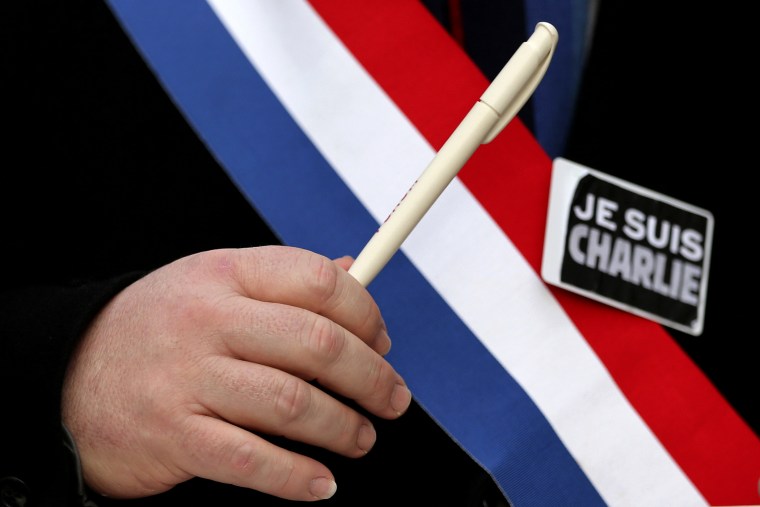This article has been translated from the original French.
As the headlines came in -- "At least 10 people killed at Charlie Hebdo" -- there was shock, and then denial. It was hard to believe, at first: 10 people injured, maybe, but not dead. And certainly not murdered. Still, as the minutes went by, the news was confirmed. The number of dead grew even larger -- 12 people had been killed. Cabu, Wolinski, Charb ... the full list of names would be known only later.
RELATED: France hunts for other terror accomplices
"French and European journalists have not been frightened by recent events into self-censorship."'
The frontpages of most French and European newspapers the next day were dark and defiant: "Barbarie," "La liberté assassinée" and most of all, "Nous sommes tous Charlie" -- We are all Charlie -- an expression that would soon become a leitmotif.
Cartoonists sharpened their pencils and payed tribute to their friends. On Twitter, websites, magazines and frontpages, tears melted with ink.
Press from all over Europe immediately joined the movement. For Italian media, it was "everyone’s freedom" that was attacked. According to La Sampa, Charlie Hebdo was a "symbol of French journalism." In Spain, where violent terrorist attacks took place in 2004, the shock was intense. "Liberty, Equality, Fraternity and Charlie Hedbo" wrote the cartoonist Antonio Fraguas. In Germany, the daily newspaper Hamburger Morgenpost chose to republish the caricatures of the Prophet Muhammad that originally incited the terrorist attacks against Charlie Hebdo. The next day, stones and an incendiary device were thrown at the newspaper’s headquarters.
News organizations across the continent stood together. "We continue to inform, to inquire, to interview, to comment, to publish – and to draw – about every subject that appears to us legitimate, in a spirit of openness, intellectual enrichment and democratic debate," declared five newspapers -- Le Monde (France), The Guardian (United Kingdom), Süddeutsche Zeitung (Germany), La Stampa (Italy), Gazeta Wyborcza (Poland) and El Pais (Spain) -- in a joint editorial. "We owe it to our readers. We owe it to the memory of our assassinated colleagues. We owe it to Europe. We owe it to democracy."
And yet, without even knowing, we were only halfway through the bloody week. On Thursday, a female police officer was killed in the south of Paris. On Friday, a man took hostages at a kosher supermarket on the edge of the capital before killing four of them.
Terror once again. We are all Charlie, but now we are also all police officers and all Jews. The video footage of the release of the supermarket hostages was broadcast around the world.
The French daily newspapers Liberation and L’Humanite decided on a special edition for the next Sunday. The remaining journalists at Charlie Hebdo are working on next week’s issue, which will have a record print run of one million copies, far above the usual 60,000. As well as mourning their friends, a huge symbolic responsibility is resting on their shoulders.
RELATED: France rocked by 54 hours of violence
Let's be honest: Charlie Hebdo was far from only having admirers and their editorial choice to publish caricatures of Muhammad made some journalists and editors grind their teeth. But no one would have thought things would go so far. Today, without questioning the right to criticize -- which is also fully part of the freedom of speech -- nobody would deny the right to publish other caricatures.
French and European journalists have not been frightened by recent events into self-censorship. On the contrary, they feel supported in their role as partisans of freedom of speech. They will continue to work and not be quiet. That is the main thing to do as we move forward.
Smiles reappeared throughout France and on the frontpages of newspapers Sunday as some 4 million French people around the country gathered for massive anti-terror rallies, including the largest ever demonstration in Paris at Place de la République. The frontpages that day rightly described the show of solidarity as "Historic." Other headlines read, "France stands up," "Paris, capital de la libertad" and "A nation united against terror."
For many people, Paris has recently become the worldwide capital for terrorist resistance. Let’s hope that we can live up to that.
Hélène Decommer is a French journalist and head of Le Plus, part of L'Obs, a weekly French news magazine.
